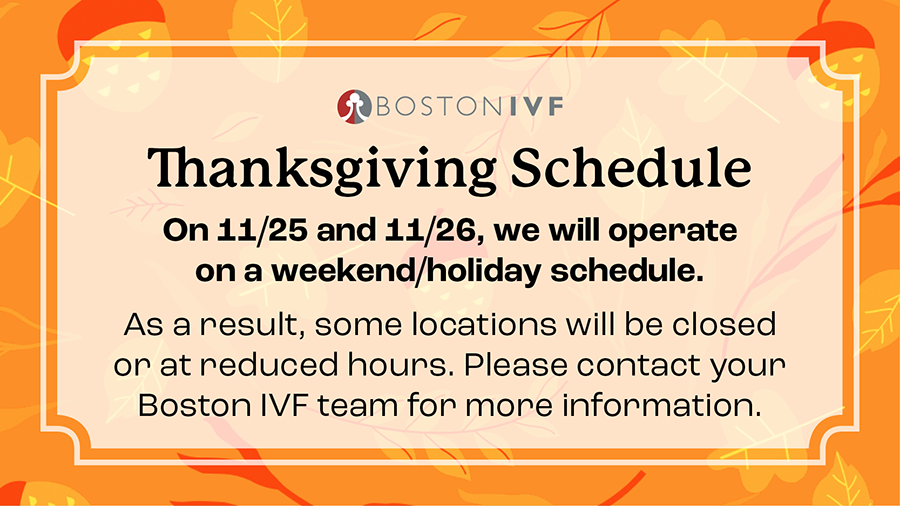For that very reason, we've gathered together our fertility team to share with you some helpful tips.
As always, if you have any questions, don't hesitate to Ask Rhonda!

"Don’t worry too much about your long-term, past use of birth control pills. Birth control does not lead to infertility, and long-term use does not interfere at all with a woman’s chances of getting pregnant. Fertility is fully restored once the pills are discontinued. It’s a concern we hear about often, so we want our patients to be as informed and confident as possible."

"Know about your family’s medical history. Inherited diseases can be passed on and subsequently affect your chance of a successful pregnancy. Genetic problems with an embryo is responsible for a high percentage of pregnancy losses before twelve weeks. Preimplantation genetic testing, in conjunction with your fertility treatments, can identify these abnormalities."

"For women age 38+, the most effective infertility treatment is IVF. In 2014, we conducted a large study that supports straight-to-IVF fertility treatment for women aged 38-42. The live birth rates for women who underwent IVF was almost double as compared to those who underwent IUI. The bottom line: time is of the essence when it comes to fertility, and an expedited fertility evaluation is crucial for older women."

"Here’s an important fact to consider from the ‘science-side’ of treatment: it isn't necessarily the number of embryos available that is significant, but the quality of those embryos. One fully-developed, high-quality embryo has far greater odds of implanting and giving you the best chance for a successful pregnancy."

"Don’t be afraid to talk about what you are going through. Although it’s easier said than done - I know from experience that expressing your feelings is vital to dealing with infertility. Sharing what you’re going through with a friend or co-worker will help you avoid feeling alone and isolated. I was surprised by how much a few chats with friends helped!"

"Monitor your thyroid levels. Low thyroid function has a negative impact on fertility and is more common than most women realize. Even a slight dysfunction can lead to infertility or a miscarriage. Low levels of thyroid hormone can interfere with the release of an egg from your ovary (ovulation), which impairs fertility. Monitoring thyroid hormone levels and taking proper medication can improve your chances."

"Even a year after having my own miscarriage, I won't say the pain goes away, but the grief absolutely does become more dull. For others who may be faced with a similar situation, try to find distractions, however small they may be. Get together with friends. Have coffee with a coworker. Date nights with my husband certainly kept our minds busy, as did focusing on the positives whenever we could!"

"Whether you want to get pregnant now or wait, it's a good idea to know where your fertility levels stand. Data shows that egg quantity/egg quality begin to decrease after age thirty, but everyone is different! We see women with infertility in their 20's and women who are very fertile in their late 30's. One test that can tell you where you stand is an AMH blood test, which gives an accurate count of your remaining egg supply."

"Know that at any given time, there are 10-15 research studies for our patients to take advantage of. Many of them offer discounted cycles, free meds, genetic testing, and more. People participate in research trials for many reasons; to assist with scientific advancements, receive cutting edge treatment, or to help future patients. If you have an interest in participating in a trial, go to our Trials page and send me an email!"

Nurse Practitioner
"Don't be nervous about an IUI. Most women say it feels similar to a Pap smear and in most cases it takes just a few minutes. While it's never a bad idea to "take it easy" after an IUI procedure, it’s perfectly fine to go back to work, go out with friends that night, or go ahead with whatever plans you have. Resting afterwards may provide a bit of comfort for you, but does not influence success."

"By waiting for embryos to develop to Blastocyst level on Day 5, we are able to better select high-quality embryos and improve the overall success rate for pregnancy. Although we remove the lesser-developing embryos on Day 5, it’s important to know that Day 3 embryos are still quite viable."

Physician Assistant
"If your OB/GYN has diagnosed you with even just a mild case of endometriosis and you are trying to conceive, we still suggest that you speak with a fertility specialist to review your specific case and chances. If you’ve had surgery to remedy endometriosis, we advise that you try to conceive as quickly as possible. Endometriosis tends to grow and reappear, so timing is certainly important."

"As a fertility nurse and a former IVF patient myself, I understand how stressful this process is. We all find comfort in situations we are able to manage, but the path to becoming a parent is something we cannot always control. Because of that, it’s very important to find ways to de-stress. Meditating, spending time with friends, taking walks, or whatever you find calming and nurturing will help you."

"Logging on to Facebook can be difficult when dealing with infertility. Pregnancy announcements, due dates, ultrasounds, and the happiness that revolves around growing families are impossible to avoid. But there are some ways to negate the feelings they cause. ‘Hiding’ the Facebook posts of a friend allows you to visit their page on your terms and helps you to take a bit more control over what you see and how it makes you feel."

"Our Third Party Reproduction Team is an amazing resource for gay men who wish to build a family through donor egg and gestational carrier. This team will help you navigate the process, show you how to select both a donor and gestational carrier, and answer any questions you may have. They are just a great group of people who are so understanding and knowledgeable."

"For those without infertility insurance benefits, the expense of IVF can be a burden. For patients who are not covered in Maine, Rhode Island, and for some in Massachusetts, we strive to create new opportunities to save money. One is our Medications Program, which offers patients a substantial savings (up to 50%) on the medications they require during IVF. This is a significant savings and well worth knowing about."

"For lesbian couples, we offer a treatment option that enables both partners to be physically involved in the conception of their baby. Through Partner Assisted IVF/Reciprocal IVF - the eggs from one partner are inseminated with donor sperm. A resulting embryo is then transferred into the uterus of the other partner - who will carry the pregnancy and give birth."

"For 75% of women with PCOS, insulin resistance is a major factor to their hormonal problems. Because insulin resistance causes diabetes, a diet that is moderate in carbohydrates, encourages unprocessed foods, and limits sugar can encourage weight loss, enhance fertility, and reduce diabetes risk. Exercise is also essential for anyone with insulin resistance, as it’s the most natural way to normalize insulin & hormone levels."

"Having an experienced IVF lab is important. Our lab has over a dozen embryologists with an average of 15 years of IVF experience. To have that knowledge in ‘one room’ is invaluable to patients. So is the advancements we're seeing with our pre-implantation genetic screening (PGT-A) test - which has revolutionized the IVF world and helps women who've experienced a failed cycle or miscarriage."

"I recommend fertility acupuncture to many of my patients, especially before and just after IUI and IVF. We find that acupuncture can reduce stress, increase blood flow to the uterus, and regulate hormone levels. It also helps with the cramping that is sometimes associated with post-IVF and IUI procedures. It's a really great service that I feel is valuable to patients, and we offer it at our center in Waltham."

"It's important to discuss your goals with your MD. If you want a single pregnancy, the approach to your cycle may be different than if you’re planning on a large family requiring several embryo transfers. The latter may indicate a cycle that creates a larger number of embryos available for freezing and use in future cycles, while the former may require lighter stimulation, reducing the number after the cycle is complete."

"We receive many, many questions from women about tubal reversal surgery versus IVF treatment and what we recommend they should choose. We feel that IVF is not only just as successful as a tubal reversal, but more convenient, safer, and less expensive. Plus, if the damage to a patient’s tubes is moderate or severe, and the tubal reversal surgery is unsuccessful, the patient will incur additional costs with an IVF cycle."

"Know you are not alone. One in six couples have trouble getting pregnant and need the help of a fertility specialist. There are so many great resources and support groups now for women and for couples, where they can talk and share experiences. Many of my patients rave about how helpful they are and how satisfying it is to be with others going through the same situations."

"Don’t automatically assume infertility is just a female issue. In 35% of all infertile, heterosexual couples - the male partner is either the sole cause or a contributing cause of infertility. In fact, infertility affects men and women equally. If a couple has trouble becoming pregnant, I strongly recommend that both partners be tested to ensure a comprehensive, faster diagnosis."

"Never look back. Always look forward! As a fertility nurse, I have seen countless patients who had all but given up on treatment, but kept going and finally became pregnant. Of course, whichever decision you make will ultimately be the right one, so trust your gut. And always-always-always ask us anything. No question is unimportant!"

"An embryology lab can offer so many opportunities to patients! Your clinical team can assess your history to determine which of our fertility technologies will offer the best chance for success without requiring the use of a ‘full menu.” Your cycle is customized to your needs, and it's exciting to see the innovation taking place on the lab side of treatment. It should give patients more confidence than ever before."

"If you are needle-phobic or just hate blood tests, ask your doctor about our needle-free saliva test that replaces the daily blood work needed to monitor your treatment. Our scientists have discovered that hormone levels found in saliva (spit) correlates with the hormone levels in the blood. It’s pretty incredible! We are the only fertility center in the world to offer this type of testing to our patients."

"In effort to support fertility patients who experience an unsuccessful IVF cycle or miscarriage, the psychologists at Boston IVF's Wellness Center offer a complementary session, where your insurance company will not be charged. During this free 30 minute visit, you can share your feelings over the cycle outcome and learn coping tools and strategies to develop a plan to empower you to continue treatment."

Physician Assistant
"If you are concerned with the chance of multiple births (twins, etc.), a single embryo transfer (eSET) is a technique that limits the number of embryos transferred during IVF. We encourage patients to consider it if they have high quality embryos. Remaining embryos can be frozen for later use. Frozen embryo transfers are now as successful as fresh transfers. Some research shows even higher success rates."

"Male fertility is a complex process that requires both the mind & body to work together. Whether you’re just starting out or have been trying for a while, making lifestyle changes to increase your fertility is essential. To optimize male fertility and improve sperm count, movement, and structure- be sure to eat a healthy diet, stay fit, lose weight, drink alcohol in moderation, stop smoking, and get enough sleep!"

"It’s amazing to think that the first IVF baby was born 35+ years ago. IVF treatments have always been founded on the basis of strong research, and for us that philosophy still holds true. We are seeing incredible innovations within our lab, and it all comes from a commitment to research. We are examining new technologies and ideas that will ultimately provide our patients with ever higher chances of success."

"When going through an IVF cycle, your anxiety levels can go through the roof. Try as best you can to keep an even keel. But try not to analyze every blood draw or ultrasound. It will drive you crazy! It's easier said than done, I know! But if your medication levels aren’t where they need to be, your team will change them as needed. Trust your doctors and nurses. Don’t hesitate to ask questions, too. That can help to alleviate stress!"

"Hang in there on this difficult journey. Infertility can be tough and take an emotional toll on you. As hard as it may be, try as much as you can to see the light at the end of the tunnel! Know that your nurses understand what you’re feeling and will fight for you. They are on your side and want to see you experience success!"

"For women who know they aren’t ready to start a family and are interested in egg freezing - the earlier you freeze your eggs, the better your chances. Regardless of when you decide to use the eggs, you’re locking in your chance of a successful future pregnancy at the age your eggs are harvested. We recommend doing so before age 37-38, when ovarian reserve is, in most cases, still good."

"Make time for yourself. Going though fertility treatments can put a great deal of stress on the people involved. Having a baby seems like it should be an easy thing to accomplish, but on so many levels, it is not. It can feel isolating and be difficult to discuss with a partner, who may be handling their feelings very differently. Learn the best ways to support each other and remember that this is all about LOVE."

"You may begin to wonder why every one of your friends are getting pregnant so easily. You may become even more nervous if your OB/GYN refers you to an infertility specialist after you've been trying on your own for months. It can be hard to come to grips with the fact that you will need help getting pregnant. But please know you are not alone. Helping patients is our mission. To guide them and be there for them."

"Be patient. It's crucial to complete required testing so that your doctor has a clear picture and can recommend the best treatment options for your particular case. More information translates to better success. Occasionally, testing can last as long as one to three months. We understand the frustration this may cause, but our ultimate goal is that you experience a healthy pregnancy as soon as possible."

Physician Assistant
"If you require donor sperm, we have a unique partnership with a national sperm bank that allows us to offer patients an inventory of high-quality donors at very low costs. Patients can use search tools to browse online donors, narrow your list, and dive deeper into donor profiles to help you make a final decision. It’s a really convenient, cost-effective way to find the right donor for you.”

Nurse Practitioner
"Utilize your nursing team! Ask us as many questions as you can. We want you to be as educated and as confident as possible and to know that we are there for you. With so many myths online about the ‘dos and donts’ of the treatment process, utilizing your nursing team will save you unnecessary stress and keep you grounded throughout your fertility treatments."

"As nurses, we are here to guide you through the process of trying to conceive and build a family. We understand that everyone's situation is unique, and we are here to support you, encourage you, and provide both clinical and emotional guidance from start to finish."

"Ask us about our Military Discount for fertility treatments. It offers 25% off IVF, Donor Egg, egg freezing, and more to Active Duty members, reserves, veterans and retirees, including spouses of the U.S. Air Force, Army, Navy, Marines, National Guard and Coast Guard."

"We understand the struggles you face dealing with infertility and the emotional roller-coaster that goes along with it. Circumstances may be both challenging and frustrating, but try not to let it consume you too much. We will be here to guide, support and encourage you every step of the way. Have faith, be patient, and persevere. Remember, you are not alone!"

"If a patient has had a negative experience with blood collection in the past, keep in mind the importance of ‘hydration.’ Proper hydration increases volume and plumps up the veins. It is most helpful when the patient hydrates during the day and evening before blood collection rather than just the morning of. Patients can also request that the phlebotomist place a small heat pack on the arm for a few minutes before!"

"If you have experienced a failed treatment, a miscarriage, it’s absolutely OK to grieve. Allow yourself time to heal, even if it involves temporarily removing yourself from social situations that might be painful. If a friend or co-worker is hosting a birthday party for their child and you know there will be many kids around, it’s completely normal for you to not want to and not have to attend. Respect yourself and your emotions."

"Understanding when you're ovulating — and having sex regularly during those times can improve the odds of conceiving. Pregnancy rates are at their highest about two days prior to ovulation. So it’s very important to have sex on these days, as well as the next few days when trying to get pregnant. Time is of the essence and a very important step."

"The donor egg or gestational carrier process can certainly be complicated, but don’t give up! You'll have the best team of doctors, nurses and staff working alongside you to accomplish your dream of having a baby. Our goal is to make sure that the process is as smooth as possible for our donor egg recipients and intended parents.”

"As a co-founder of Boston IVF, I always want patients to feel confident in the care they receive. It's so important, and it's something we deliver on. We really stand out from the rest by our ability to accurately diagnose both routine and rare cases. By using more than 30 years of important treatment cycle data, we can identify unique trends that help us to make an accurate diagnosis."

"If you are considering gender transition, don’t hesitate to reach out to our team for guidance. More and more, we are seeing tremendous fertility developments for the trans community. We offer egg and sperm freezing – and some insurance companies are now covering treatment costs! It’s so great to see!"




